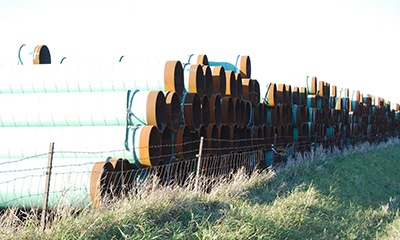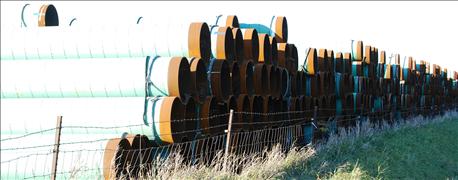July 28, 2016

The U.S. Army Corps of Engineers on July 26 issued permits clearing the way for the Bakken oil pipeline to cross rivers and other waterways in Iowa. This is one of the final regulatory hurdles the pipeline faced, as it is already under construction in various sections of the state. The Corps of Engineers has jurisdiction over about 3% of the pipeline’s planned route.

CONSTRUCTION BEGINS: Much of the Iowa pipeline route will cross farmland, where the pipe will be buried under a minimum of 48 inches of soil. Ag drainage tiles will be crossed with a minimum of 24 inches of separation between the pipe and the drain tile.
The Corps of Engineers office in Rock Island, Ill., notified Dakota Access LLC, the company that’s building the pipeline, of the corps’ official decision. Dakota Access is a subsidiary of Energy Transfer Partners, a company based in Dallas, Texas. Corps officials say there will be follow-up inspections to make sure the company is complying with the terms and conditions of the permits. This will include wetland mitigation sites.
These new permits allow Bakken pipeline to cross streams
Dakota Access was previously authorized to start construction on the pipeline in June, when the Iowa Utilities Board ruled that construction could start in areas where the necessary permissions and easements had been granted. However, this week’s permits issued by the Corps of Engineers is a major step forward for the project. The pipeline will enter northwest Iowa and run diagonally through the state, exiting the southeast corner. It will stretch across 346 miles of Iowa, running through 18 counties.
With these Corps of Engineers permits the pipeline can now be constructed in long stretches through areas that include rivers and streams. Several lawsuits are still pending however, as some private landowners are challenging the Iowa Utilities Board’s approval of the pipeline and the use of eminent domain to condemn privately held Iowa land for the project.
Company plans to have pipeline built and operating by end of 2016
The underground pipeline will transport crude oil 1,150 miles from the Bakken oil fields of North Dakota through South Dakota and Iowa, ending at a distribution hub at Patoka, Ill. The $3.8 billion pipeline project has now been granted a permit to be built in all four states, says Lisa Dillinger, spokeswoman for Dakota Access LLC. “We will now move forward in all areas as quickly as possible, to try to get all construction activities finished in one growing season and have the pipeline be in service by the end of this year,” she says.
Construction activity is already underway on all four “spreads” or sections of work along the route in Iowa, says Dillinger. This includes staking, grading, clearing and building temporary roads, fences and gates as the early stages of construction. A couple of areas of construction that began in early June in southeast Iowa have started laying pipe on the surface of the ground and welding the pipe together. Dillinger says the company has signed easements on 96% of the property along the route in Iowa. It has signed 100% of the properties in North Dakota, South Dakota and Illinois.
Opponents of project remain hopeful they can get it stopped
Iowa Citizens for Community Improvement, an activist group that opposes the pipeline being built, says the permits issued by the Army Corps of Engineers on July 26 essentially allow the pipeline to cross 64 Iowa waterways. Cherie Mortice, president of ICCI, criticized the corps’ decision and said she wasn’t surprised. “It has been business as usual for Iowa and federal regulators, putting corporate interests ahead of the common good and the good of our land,” she said.
Leaders of Bold Iowa, the Bakken Pipeline Resistance Coalition and other anti-pipeline groups, are vowing to continue their opposition. They are recruiting people to engage in non-violent civil disobedience to delay and halt construction of the pipeline in Iowa. There are also the eminent domain lawsuits that have been filed but are waiting to proceed and have yet to be settled.
Business, industry, labor unions favor pipeline construction
“The pipeline is all risk and no reward for Iowa,” says Dick Lamb, a Boone County landowner whose farm is in the pipeline’s path. “It’s not a question of if, but when it will leak and when it does it will destroy valuable Iowa farmland and the streams, rivers and other waterways we depend on.”
However, leaders of the Midwest Alliance for Infrastructure Now, a coalition of business, union labor and farm groups, applauded the Corps of Engineers’ issuing of the permits for the pipeline. “Thousands of American workers from labor unions in the Midwest are already benefitting from this project,” says Bill Gehard of Iowa City, president of the Iowa Building and Construction Trades Council, a labor union organization.
You May Also Like




